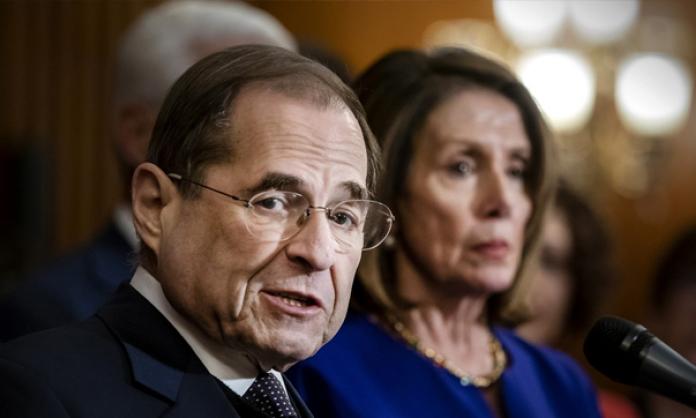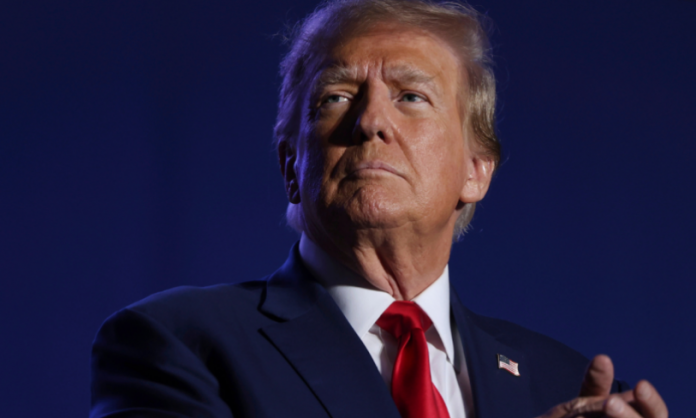Chicago mobster Al Capone built a fortune and a small empire in the 1920s through bootlegging, brothels and extortion. He protected the operation by bombing uncooperative businesses, killing rivals and paying off police and politicians. “Scarface”, as Capone was known, was taken down in 1932 – but only for federal tax evasion. He spent seven-and-a-half years in jail before retiring to Palm Island in Miami, Florida, where he lived out his remaining days. In his absence, the Chicago underworld continued to flourish with the connivance of the city’s cops and political establishment.
The Capone saga feels relevant as congressional Democrats initiate impeachment proceedings against a more powerful Don – president Trump. By concentrating on this bureaucratic strategy, they are, like the authorities in Capone’s day, restricting the charges to the narrow ground of impropriety: abuse of power, obstruction of justice and collusion.
It makes sense for Democrats to do so because their own political acreage is littered with graver crimes in which they are co-conspirators with their purported adversaries, and on which they don’t want attention focused: quid pro quos with Wall Street, Big Oil, Big Pharma and private prisons, which have immiserated sections of the US working class, left people to suffer and die needlessly for lack of health care, and savaged black communities and undocumented migrants. Then there’s their marriage with the military industrial complex and the deployment of the armed forces in a permanent, extortionate project for world domination that has resulted in countless foreign governments overthrown and tens of millions murdered. No impeachments for any of that.
If Trump is the mobster – an outlaw primarily concerned about himself, his family and his associates – the Democrats are less the colluding city officials than they are the Federal Bureau of Investigation: the exterminators of political opposition in defence of the gangsterism of the whole capitalist establishment, which enriches itself through a more orderly “rules based” exploitation. Trump may be guilty of many excesses. But the impeachment, like the theory about his purported collusion with Russia during the 2016 presidential election, is yet another diversion from this.
Duplicity, back scratching, profiteering and abuse of power are in the DNA of capitalist politics, which has a genetic contradiction: the system enriches the minority at the expense of the majority, yet politicians overseeing the system rely on the votes of the majority to retain office. Members of the establishment know this contradiction is routinely exposed by unfulfilled promises – i.e. the lies they tell to get elected. But they do everything to deny the conflict between classes and to paper it over when they can. For them, political high culture – the art of drawing esteem from all quarters – is getting what you want without saying what it is that you want or what it is you intend to do.
The Democrats are virtuosos of this high culture, Barack Obama their Michelangelo. “Yes, we can”, his presidential election slogan, rang out across the country in the lead-up to his historic victory in 2008. But yes we can what? Continue as usual, shattering the dreams of millions who wanted change. So smooth was Obama that he won the Nobel Peace Prize after less than a year in office while dramatically escalating US drone strikes with a secret a “kill list” of targets internationally. Within the DC beltway, his manipulations are considered masterful communication. Trump’s crimes, in establishment eyes, as much relate to the egregiousness of the duplicity as to the dishonesty itself. Lying and killing they understand – but in Democratic eyes, the Don undermines the office of the presidency. Nothing could be more heinous.
While Trump retains the most powerful post on the planet, he remains merely an expression of the economic, social and political polarisation evident in the US and around the world, which would be untouched by his removal from the White House. Dealing with the problem of Trump, then, will require more than a few hundred congressional representatives ousting him.
It will require the marginalisation of his base through a mass movement of workers and the oppressed fighting for a world run in the interests of the majority. That will involve weakening and challenging capitalism’s state institutions and political representatives. It will involve a frontal assault on the interests and arrogance of the rich and powerful. In short, it will require a direct attack on the Democratic establishment, which today is an increasingly wide section of the US bourgeoisie and the main impediment to an alternative politics being built from the ground up.
The last two election cycles indicate the party’s growing hegemony among the US upper middle and ruling classes. Analysis of the 2016 presidential election by Ryne Rohla, a PhD candidate at Washington State University, found an average swing (compared with the 2012 election) of 30 percentage points to Democratic candidate Hillary Clinton in neighbourhoods at least 90 percent white and with a median annual income $175,000. In those with a median income of $200,000, it was around 35 points. In the richest areas, she did even better. “The precinct data implies that Mrs Clinton’s gains were concentrated among the wealthiest voters; she carried precincts where the median income was over $250,000 by a 27-point margin and improved by 39 points over Mr Obama’s performance”, New York Times election analyst Nate Cohen noted last year. A similar trend was evident at the congressional level in the 2018 midterm elections, in which the Democrats won most of the House of Representative positions, picking up Republican seats in wealthy suburban districts.
The Democrats’ primary goal is to become the enduring party of choice for big capital – the party of enforcers. They want any challenge to Trump to be restricted to a change in personnel so that capitalist rule is protected and strengthened. And they want workers and oppressed groups to have confidence in the high offices of US capitalism – to venerate the institutions of their own oppression. This is why the party establishment wants impeachment proceedings run on the most right wing terrain possible: foreign interference in US elections and misuse of money allocated for national security. The more these are made the focus, the greater the ability of the establishment to drown out popular calls for Medicare for all and increased taxes on the billionaire class to pay for free college tuition, to sideline debates about abolishing the Immigration and Customs Enforcement agency and to convince everyone that the greatest threat to their lives and to democracy is the “norm erosion” of Trump, rather than the norm of capitalist exploitation itself, which forever enriches the scions of the Democratic and Republican parties alike.
Many establishment Democrats, led by House speaker Nancy Pelosi, until recently resisted calls for impeachment coming from the progressive wing of the party – from Maxine Waters, Rashida Tlaib, Ilhan Omar, Alexandria Ocasio-Cortez, Elizabeth Warren and, more recently, Bernie Sanders, for example. Impeachment was considered a threat to the electoral prospects of right wing Democrats who secured the party’s House majority by winning over wealthy Republican voters in 2018. Now, however, with official pressure building on Trump and a batch of freshman Democrats from the military and intelligence establishment calling for impeachment on 24 September, Pelosi has taken the reins of the proceedings. In so doing, she may have cornered the party’s liberal wing, which carried on just as much as the anti-Trump right about Trump trashing the sacred US constitution, jeopardising national security and so on.
Impeachment in itself is not necessarily objectionable. In certain circumstances, a mass movement for the removal of an officeholder might be built out of the process, depending on what it uncovered. But the self-perpetuating logic of endless congressional hearings, which is what this impeachment portends, is likely to be terrible terrain for the left – worse ground even than the electoral politics that, every two years, acts as quicksand for progressives. But at least an election involves mobilising support within the population, winning arguments and putting forward a vision of what society could or should look like. This impeachment is a clash of institutional powers and wholly the terrain of the bourgeoisie. That’s why Pelosi and the Democratic establishment have so deftly taken control despite their earlier reservations. What a disaster: all this hatred among the population for the president, yet the resistance is led by millionaires and a loyalist CIA whistleblower.
History judges Capone and his associates as some of the most despicable specimens to have graced Chicago. Trump will be judged similarly in terms of US politics. His presidency lends itself to pious appeals for the restoration of public virtue and to notions of a republic redeemable through its own institutions – in this case, the Congress abiding by its constitutional duty to hold the executive branch to account. But if you listen hard enough to these appeals, it’s the Feds knocking at the door. You’d want to be very careful about welcoming them in.










